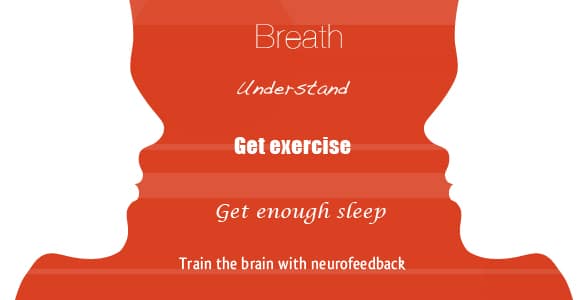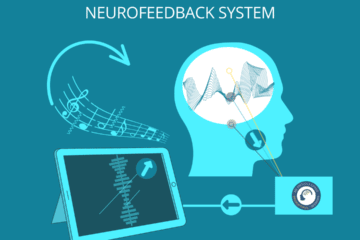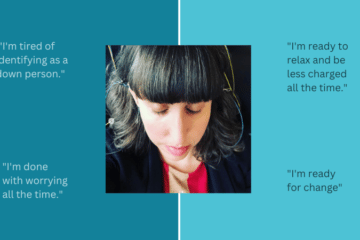A Case Study on Anxiety and Depression
Why are lawyers so prone to anxiety, depression and anger outbursts?
Frank walked into my office and said, “I was in therapy for 15 years, know my ‘issues’ inside and out, but I’m still taking an anti-depressant and an anti-anxiety med when I have to do any major presentation at the firm. It’s like my baseline is off. It’s great for being a lawyer. I’m always hyper-vigilant—looking out for the next danger, working very hard to stay on top of everything. But when I get into bed at night, my mind is racing and I feel this sinking feeling. Still, after all this therapy. What can you do for me?”
Frank doesn’t have a motivation problem, or a lack of insight problem. Frank has a brain problem.
Frank had come into my office after having done research into the benefits of neurofeedback . I see clients like Frank every day and I call them my “Worrier Warriors”. Their nervous systems are in a state of ‘activation’ where the flight/fight/freeze brain is always in go-mode. And he’s right—it serves a law firm well. These brains are habitually trained to be on the watch for danger. Add a good analytic mind to that mix and you’ll have a highly successful lawyer who protects his or her clients well but at a high cost of health and happiness.
We’ve come a long way in our understanding of the brain and brain functioning in producing high-stress levels. In the mental health field, we used to think of them as ‘mind’ problems, but now we’ve come to understand that they are also brain problems.
We all know we are ‘creatures of habit’ but what that really means is that the brain is prone to habituated rather than fresh responses. The brain functions to be most efficient and effective in the use of its energy to protect and maintain the body. The flaw in this system design is that the brain becomes efficient by using cues to approximate the present situation and then uses an old response pattern, which leads to misperceptions of the present moment and less than appropriate responses. We’ve all seen someone “lose it” and respond with an angry outburst when the situation warranted concern or a firm voice.
A dramatic and sad illustration of this principle is the war vet who comes home with Post Traumatic Stress Disorder (PTSD) from his years of service. As a soldier, he has been trained to respond to danger with a ‘fight’ response. But now he is home from the war and is walking down his hometown street when a car backfires. The brain is habituated to “loud sound equals danger” and the vet’s brain goes into fight mode—yelling, pushes someone or becomes highly irritable and later starts a fight with a loved one.
An important piece of information to know about the part of the brain that operates the fight/flight response: it does not take orders from anyone. It is a part of the brain that needs to be able to respond in milliseconds, so it doesn’t take in information from other, more rational and analytic parts of the brain. As a result, you could say to yourself, “I really shouldn’t get angry and fly off the handle.” But the part of the brain that decides that action, acts without input from our rational, willful self. It takes in sensory input and then makes a snap decision.
Why are lawyers so prone to anxiety, depression and anger outbursts?
Their brains are habituated to the flight/flight/freeze response (anger/anxiety/depression) response. For whatever reason, and there could be many, they experienced a threat or threats at some point in their lives that were significant enough to habituate the brain to being in this activation mode. A quick way to find out if you are is to ask yourself this question, and answer quickly without thinking: Is the world a safe place?
If the answer is ‘no’ then chances are your brain is habituated to thinking that you are in danger when you aren’t. It makes you a perfect candidate to become a lawyer where you always have to be thinking about what the risks are in any situation. Or to be an ENT or an emergency room doctor. Your brain is habituated to perceive risk.
Now what to do about this habituated brain?
5 Tips to be Less Anxious:
Breathe. Seriously. The breath, slow and deep breathing are ways we can “tell” the brain that we are safe and it can go into a state of relaxation and regulation. Slow deep breathing for 5 minutes where you work your way up to counting to 5 on the inhalation and 5 on the exhalation will do wonders to communicate to the brain to come out of fight/flight and into calm awareness (the state of a regulated and balanced brain.)
Understand: Help yourself by having a good and clear conceptual understanding that your anxiety and depression and anger outbursts are brain over-reacting, not an accurate assessment of the present moment’s situation. Your brain is reading a newspaper that’s 20 years old and acting as if it’s the here-and-now news.
Get exercise: I recently had a neurologist tell me that if the positive effects of exercise (increased heart rate 30 mins 5 times a week) were a drug, it would be considered a “miracle drug” and would generate billions of dollars a year in revenue.
Get enough sleep. Studies are now coming out showing the detrimental effects of chronic sleep deprivation—5 hours a night or less—on the development of chronic conditions.
Train the brain with neurofeedback. Neurofeedback trains the brain to optimize its functioning through allowing the brain to ‘see’ its unhelpful response patterns. And the brain learns to use the present moment to decide its next action rather than using those old habitual response patterns. As a result, the trained brain sleeps better, is calmer, is better able to focus, and is more cheerful. And as one client said, “I have the same problems, they just don’t get to me anymore.”
This Article is also posted on the website: www.lawyerswithdepression.com
Learn more about how neurofeedback can help manage stress and improve sleep habits. Watch a video on how this brain training works and about your training options NeurofeedbackTraining.com
Natalie Baker, MA LMHC, works as a psychotherapist and neurofeedback trainer in private practice in New York City. Call (347) 708-6177 to schedule neurofeedback and/or therapy session.



